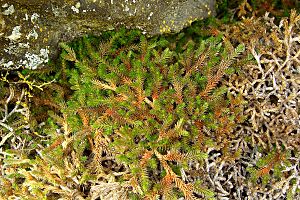Wallace's spikemoss facts for kids
Quick facts for kids Wallace's spikemoss |
|
|---|---|
 |
|
| Scientific classification |
Selaginella wallacei, also known as Wallace's spikemoss, is a fascinating small plant. It belongs to a group of plants called spikemosses. These plants are very old, like distant relatives of ferns.
You can find Wallace's spikemoss growing in western North America. It lives in places from British Columbia down to California and across to Montana. This plant is very adaptable. It can grow in many different kinds of places. You might see it in sunny, open areas or in shady spots. It can also live in both wet and dry environments.
Contents
Wallace's Spikemoss: A Resilient Plant
What is a Spikemoss?
Wallace's spikemoss is a type of lycophyte. Lycophytes are a group of ancient plants. They are different from flowering plants because they do not produce flowers or seeds. Instead, they reproduce using tiny spores. Spikemosses are known for their unique, scale-like leaves.
What Does It Look Like?
This spikemoss can look quite different depending on where it grows. It changes its shape to fit its habitat. Sometimes, it spreads out with many thin branches. Other times, it forms a small, dense mat close to the ground.
Its stems can grow up to about 25 centimeters (10 inches) long. However, in very dry places, the stems might stay much shorter. The stems often fork, meaning they split into two parts. Along the stems, you'll find small leaves. These leaves are usually linear, lance-shaped, or oblong. They can be up to 4 millimeters long. Each leaf has tiny bristles at its tip.
How Does It Reproduce?
Like other spikemosses, Selaginella wallacei reproduces using spores. The plant produces special structures called strobili. These strobili are like cones or spikes. They hold the reproductive parts of the plant. The strobili can grow quite long, sometimes reaching up to 9 centimeters (3.5 inches). Inside these strobili, the plant produces its spores. When the spores are ready, they are released to grow into new plants.

